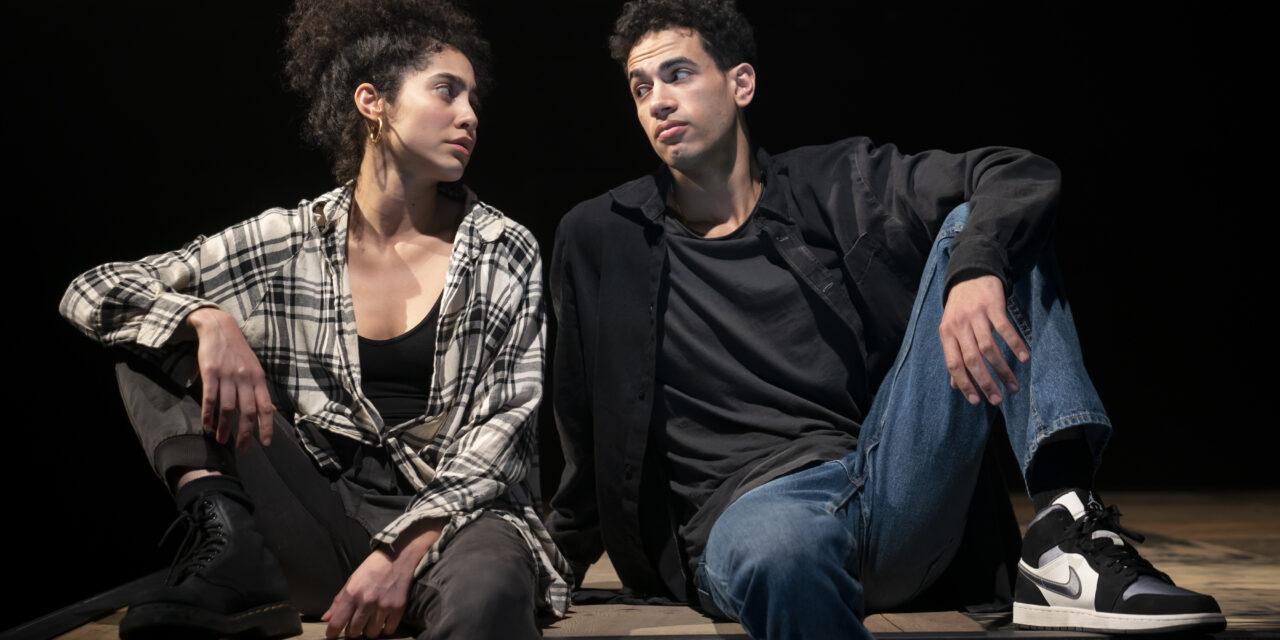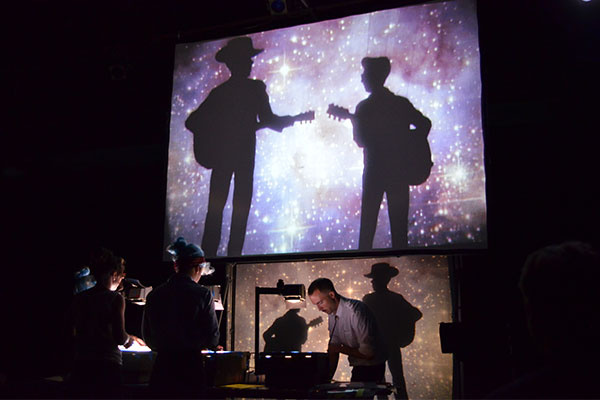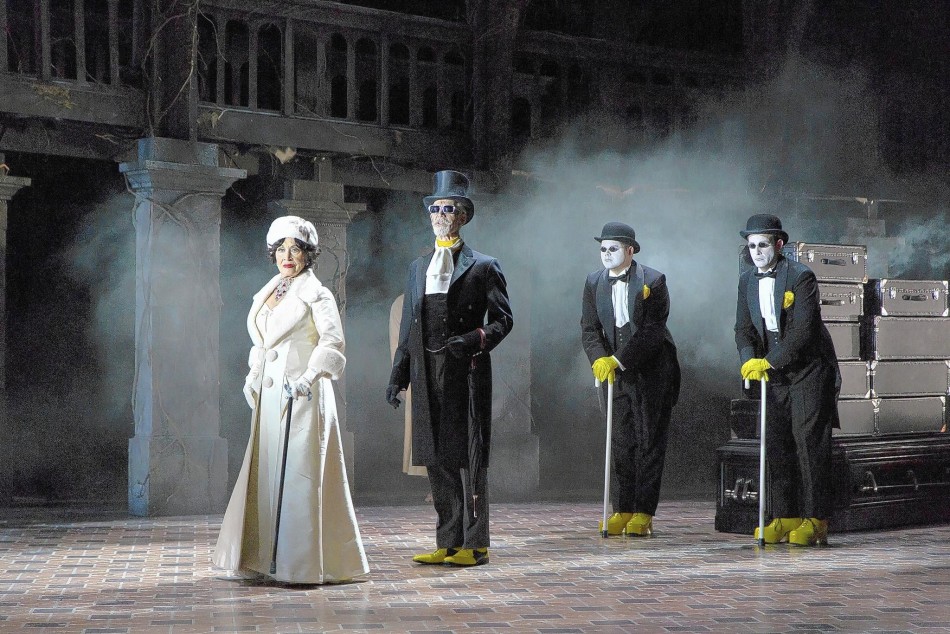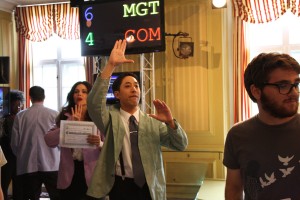by Carol Rocamora . . .
“Minimalism” is a term you hear often in the theatre these days, pertaining to writing, direction, or production design. It’s a child of great theories like Jerzy Grotowski’s “poor theatre” or Peter Brook’s “the empty stage”. Sometimes, it’s born of necessity, for example, in the urgent works of the Belarus Free Theatre, exiled from their homeland, working with little or no resources. Other times, it’s practiced by daring directors like David Cromer, James MacDonald, Ivo van Hove (sometimes), and of course Peter Brook, who pride themselves in creating theatre out of nothing.
But there’s something about the production of Sanctuary City, Martyna Majok’s thrilling new play, that takes minimalism to a new level of artistry. Dialogue is stripped into fragmented phrases. Scenes last a few seconds – at least in the first half of this 100-minute play. Two of the three characters’ names (B and G) are incomplete. The action often repeats itself. Though there is an ultimately chronology of events, it’s left for the audience to discern. There is no scenery. Powerful sound and lighting cues fill in the voids of the narration.
This is how Majok chooses to tell her moving story about two teenagers – both children of undocumented immigrants – and their passionate dream of becoming American citizens. The result of these choices is explosive, and ultimately deeply moving.
We first meet these characters on an empty stage that we soon learn is a room in an apartment in Newark, New Jersey, where B (for Boy, played by Jasai Chase-Owens) lives with his mother, an undocumented immigrant from an unnamed country. There’s a banging on the window (we don’t see it – we hear it, because there is no scenery) – and it’s G (for Girl, played by Sharlene Cruz). Her stepfather has beaten her and her mother (also an undocumented immigrant), so G has climbed up the fire escape of her high school classmate’s building and seeking refuge in his room.
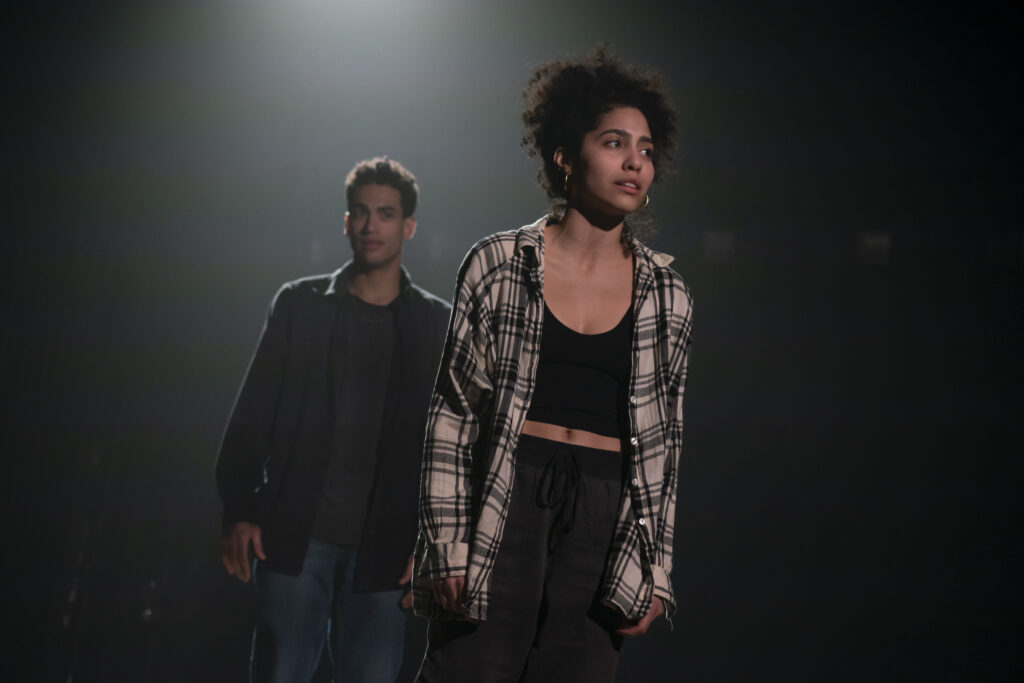
During the first part of the play, this becomes a nightly occurrence – and a solace for both characters. The two youngsters juggle complicated lives – B goes to school and works as a dishwasher with little time for homework. G, a victim of abuse, is nonetheless determined, diligent student. Both desperately want to go to college. In fragmented scenes that last five seconds at most, we learn that B’s mother has returned to their native land, leaving him alone, with no hope of naturalization. Meanwhile, G’s mother finally is naturalized, thereby making G a citizen as well. We then learn that G has been accepted to college in Boston with a scholarship. But before she goes, she promises B she will marry him and make him a citizen as well, in return for the refuge he has given her.
By the end of the first half of the play, these two characters – beautifully acted under Rebecca Frecknall’s exquisite, sensitive direction – have won our hearts. Their friendship for each other is beautiful, based on companionship, kindness, trust and appreciation. “Thank you.” “No problem” is a mantra repeated over and over again between them. In one of Frecknall’s delicate touches, the teenagers – who share an invisible twin bed – stand together and simulate sleep, not touching. G ultimately leaves, repeating her promise to marry B – and B presents her with his mother’s ring, as a gesture of their commitment. Their avoidance of physical intimacy is interpreted as a sign of respect – that is until the second part of the play.
In Part II (no intermission, three and half years later), a third character named Henry (Austin Smith) is introduced – and the reason for B and G’s delayed physical intimacy becomes clear. I offer no more details, lest I spoil the deeply moving outcome of this heartwarming, heartrending story – which includes the revelation of painful lies and betrayals in this newly formed triangle.
Suffice it to say, this new work is a thrilling new introduction to the 2021-2022 theatre season we have hoped and prayed for. The acting and direction are breathtaking, as are the sound and light design by Isabelle Byrd and Mikaal Sulaiman respectively. At the culmination of the matinee performance I attended, the audience cheered with admiration and gratitude.
Curtain up, at last, on a rich new work about home, friendship, sacrifice, trust, and love.
Photos: Joan Marcus
Sanctuary City, by Martyna Majok, directed by Rebecca Frecknall, a New York Theatre Workshop now playing at the Lucille Lortel Theatre until October. 17.


